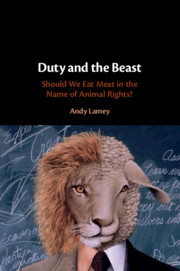Book contents
- Duty and the Beast
- Duty and the Beast
- Copyright page
- Contents
- Acknowledgments
- Introduction: The New Animal Debate
- Chapter 1 The Case for Animal Protection
- Chapter 2 A View to a Kill
- Chapter 3 Burger Veganism
- Chapter 4 The Dinner of Double Effect
- Chapter 5 Killing Them Softly
- Chapter 6 What Is It Like to Be a Chicken?
- Chapter 7 The Logic of the Larder
- Chapter 8 Thinking Like a Plant
- Chapter 9 Long Live the New Flesh
- Bibliography
- Index
Chapter 7 - The Logic of the Larder
Published online by Cambridge University Press: 25 March 2019
- Duty and the Beast
- Duty and the Beast
- Copyright page
- Contents
- Acknowledgments
- Introduction: The New Animal Debate
- Chapter 1 The Case for Animal Protection
- Chapter 2 A View to a Kill
- Chapter 3 Burger Veganism
- Chapter 4 The Dinner of Double Effect
- Chapter 5 Killing Them Softly
- Chapter 6 What Is It Like to Be a Chicken?
- Chapter 7 The Logic of the Larder
- Chapter 8 Thinking Like a Plant
- Chapter 9 Long Live the New Flesh
- Bibliography
- Index
Summary
A long-standing view holds that animals benefit from the fact that we eat them. So long as the animals in question are well treated, proponents of this view suggest, it is better for them to come into existence than not. If so, then we should embrace some form of meat eating to advance this outcome. The view is known as the Logic of the Larder, or the larder argument for short. In recent decades it has drawn support from arguments in population ethics that maintain that the best state of affairs is one in which well-being is maximized. I challenge the larder argument for creating food animals by defending a new principle applicable to population ethics. It holds that a necessary condition of an outcome being morally good (i.e., morally obligatory or supererogatory) is that failing to bring it about will be bad for someone. If this principle is true, then the Logic of the Larder is drained of its force, as the theory of population ethics on which it depends is not cogent. After defending my principle from objections I briefly discuss a variation of the Logic of the Larder argument put forward by Jeff McMahan.
- Type
- Chapter
- Information
- Duty and the BeastShould We Eat Meat in the Name of Animal Rights?, pp. 177 - 198Publisher: Cambridge University PressPrint publication year: 2019

